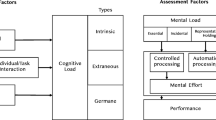Abstract
This paper demonstrates that different software code inspection techniques have the potential to improve developer understanding of code being inspected to varying extents. This suggests that some code inspection techniques may be superior to others with respect to improving the efficacy of future inspections, harnessing collective wisdom, and extending team knowledge and networked intelligence. In particular, this paper reports results from a study of novice developers’ cognitive development during a software inspection training exercise. We found that developers who performed a code inspection prior to modification tended to operate at higher cognitive levels beginning very early in the modification exercise. Those who had not performed an inspection tended to operate at lower cognitive levels for longer periods of time. Results highlight the importance of code inspections in increasing developers’ understanding of a software system. We believe collaboration between academia and industry in studies such as these would benefit the three major stakeholders: academia, industry and graduates.
Access this chapter
Tax calculation will be finalised at checkout
Purchases are for personal use only
Preview
Unable to display preview. Download preview PDF.
Similar content being viewed by others
References
Anderson, L.W., Krathwohl, D.R., Airasian, P.W., Cruikshank, K.A., Mayer, R.E., Pintrich, P.R., Raths, J., Wittrock, M.C.: A Taxonomy for Learning, Teaching, and Assessing: A Revision of Bloom’s Taxonomy of Educational Objectives. Longman, New York (2001)
Basili, V.R.: Evolving and packaging reading technologies. Journal of Systems Software 38(1), 3–12 (1997)
Bergantz, D., Hassell, J.: Information relationships in prolog programs: how do programmers comprehend functionality? Int. J. Man-Mach. Stud. 35(3), 313–328 (1991)
Bloom, B.: Taxonomy of Educational Objectives Cognitive Domain. David McKay Company, Inc. (1956)
Brooks, R.: Towards a theory of the comprehension of computer programs. International Journal of Man–Machine Studies 18(6), 543–554 (1983)
Cooper, D., von Konsky, B., Robey, M., McMeekin, D.A.: Obstacles to comprehension in usage based reading. In: Proc. 18th Australian Conference on Software Engineering (ASWEC 2007), pp. 233–244 (2007)
Dunsmore, A.: Investigating effective inspection of object-oriented code, PhD thesis, Strathclyde University, U.K (2002)
Dunsmore, A., Roper, M., Wood, M.: Systematic object-oriented inspection - an empirical study. In: ICSE 2001: Proceedings of the 23rd International Conference on Software Engineering, pp. 135–144 (2001)
Dunsmore, A., Roper, M., Wood, M.: The development and evaluation of three diverse techniques for object-orientated code inspection. IEEE Transactions on Software Engineering 29(8), 677–686 (2003)
Ericsson, K.A., Simon, H.A.: Protocol Analysis. The MIT Press, Cambridge (1993)
Fagan, M.E.: Design and code inspections to reduce errors in program development. IBM Systems Journal 15(3), 182–211 (1976)
Fisher, C.: Advancing the study of programming with computer-aided protocol analysis, pp. 198–216 (1987)
Gilb, T., Graham, D.: Software Inspection. Addison–Wesley, Wokingham (1993)
Humphrey, W.: A Discipline for Software Engineering. Addison–Wesley, Boston (1995)
Kelly, T., Buckley, J.: A context-aware analysis scheme for Bloom’s Taxonomy. In: ICPC 2006, Proceedings of 14th IEEE International Conference on Program Comprehension, pp. 275–284 (2006)
Laitenberger, O., DeBaud, J.: An encompassing life cycle centric survey of software inspection. Journal of Systems and Software 50(1), 5–31 (2000)
Littman, D., Pinto, J., Letovsky, S., Soloway, E.: Mental models and software maintenance. Journal of Systems Software 7(4), 341–355 (1987)
von Mayrhauser, A., Vans, A.: Identification of dynamic comprehension processes during large scale maintenance. Transactions on Software Engineering 22(6), 424–437 (1996)
McMeekin, D.A., von Konsky, B.R., Chang, E., Cooper, D.J.A.: Checklist Based Reading’s Influence on a Developer’s Understanding. In: Proc. 19th Australian Conference on Software Engineering (ASWEC 2008), pp. 489–496 (2008)
Moore, D.S., McCabe, G.P.: Introduction to the Practice of Statistics, 4th edn. W.H. Freeman, New York (2002)
Shull, F., Rus, I., Basili, V.: Improving software inspections by using reading techniques. In: ICSE 2001: Proceedings of the 23rd International Conference on Software Engineering, pp. 726–727 (2001)
Siy, H., Votta, L.: Does the modern code inspection have value? In: Proceedings of IEEE International Conference on Software Maintenance, pp. 281–289 (2001)
Sjoberg, D.I.K., Hannay, J.E., Hansen, O., Kampenes, V.B., Karahasanovic, A., Liborg, N., Rekdal, A.C.: A Survey of Controlled Experiments in Software Engineering. IEEE Transactions on Software Engineering 31(9), 733–753 (2005)
Tyran, C.K., George, J.F.: Improving software inspections with group process support. Communications of the ACM 45(9), 87–92 (2002)
Xu, S., Rajlich, V.: Cognitive process during program debugging. In: Proc. Third IEEE International Conference on Cognitive Informatics, pp. 176–182 (2004)
Xu, S., Rajlich, V.: Dialog-based protocol: an empirical research method for cognitive activities in software engineering. In: Proc. of International Symposium on Empirical Software Engineering (2005)
Xu, S., Rajlich, V., Marcus, A.: An empirical study of programmer learning during incremental software development. In: Proc. Fourth IEEE Conference on Cognitive Informatics (ICCI 2005), pp. 340–349 (2005)
Author information
Authors and Affiliations
Editor information
Editors and Affiliations
Rights and permissions
Copyright information
© 2009 ICST Institute for Computer Science, Social Informatics and Telecommunications Engineering
About this paper
Cite this paper
McMeekin, D.A., von Konsky, B.R., Chang, E., Cooper, D.J.A. (2009). Measuring Cognition Levels in Collaborative Processes for Software Engineering Code Inspections. In: Ulieru, M., Palensky, P., Doursat, R. (eds) IT Revolutions. IT Revolutions 2008. Lecture Notes of the Institute for Computer Sciences, Social Informatics and Telecommunications Engineering, vol 11. Springer, Berlin, Heidelberg. https://doi.org/10.1007/978-3-642-03978-2_5
Download citation
DOI: https://doi.org/10.1007/978-3-642-03978-2_5
Publisher Name: Springer, Berlin, Heidelberg
Print ISBN: 978-3-642-03977-5
Online ISBN: 978-3-642-03978-2
eBook Packages: Computer ScienceComputer Science (R0)




